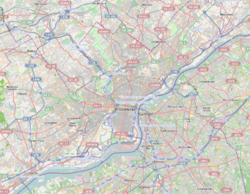Tulpehocken (SEPTA station)
| SEPTA Regional Rail | ||||||||||||||||||||||||||

The station at Tulpehocken in October 2012, seen after the restoration efforts.
|
||||||||||||||||||||||||||
| Location | 314 West Tulpehocken Street Germantown, Philadelphia, Pennsylvania |
|||||||||||||||||||||||||
| Coordinates | 40°2′6.36″N 75°11′12.48″W / 40.0351000°N 75.1868000°W | |||||||||||||||||||||||||
| Owned by | SEPTA | |||||||||||||||||||||||||
| Line(s) | ||||||||||||||||||||||||||
| Platforms | 2 side platforms | |||||||||||||||||||||||||
| Tracks | 2 | |||||||||||||||||||||||||
| Connections | SEPTA City Bus: Routes 53, 65 | |||||||||||||||||||||||||
| Construction | ||||||||||||||||||||||||||
| Parking | 35 | |||||||||||||||||||||||||
| Other information | ||||||||||||||||||||||||||
| Fare zone | 2 | |||||||||||||||||||||||||
| History | ||||||||||||||||||||||||||
| Opened | 1878 | |||||||||||||||||||||||||
| Electrified | 1918 | |||||||||||||||||||||||||
| Previous names | Walnut Lane | |||||||||||||||||||||||||
| Services | ||||||||||||||||||||||||||
|
||||||||||||||||||||||||||
|
Tulpehocken Station Historic District
|
||||||||||||||||||||||||||
| Location |
Germantown, Philadelphia Pennsylvania, USA |
|||||||||||||||||||||||||
| Coordinates | 40°2′6.36″N 75°11′12.48″W / 40.0351000°N 75.1868000°WCoordinates: 40°2′6.36″N 75°11′12.48″W / 40.0351000°N 75.1868000°W | |||||||||||||||||||||||||
| Built | 1878 | |||||||||||||||||||||||||
| Architectural style | Late Victorian | |||||||||||||||||||||||||
| NRHP Reference # | 85003564 | |||||||||||||||||||||||||
| Added to NRHP | November 26, 1985 | |||||||||||||||||||||||||
Tulpehocken station is a SEPTA Regional Rail station in Philadelphia, Pennsylvania. Located at 314 West Tulpehocken Street in the Germantown neighborhood, it serves the Chestnut Hill West Line. It is also known as Walnut Lane Station. The Pennsylvania Railroad built the station in 1878 from a design by Frank Furness, according to the Philadelphia Architects and Buildings project. The station is in zone 2 on the Chestnut Hill West Line, and is 8.5 track miles from Suburban Station. In 2004, this station saw 176 boardings on an average weekday.
Although commonly attributed to architect Frank Furness, the actual architects for all of the stations on the Chestnut Hill West line (part of the Pennsylvania Railroad at the time) were William Brown and William Bleddyn Powell, who were under contract to PRR. This information comes from the Philadelphia Historical Commission in its nominations for the registry of Historic Places. (Furness designed station buildings on the Reading Railroad.) All of the Chestnut Hill West stations are now on the Philadelphia Register of Historic Places. The Tulpehocken Station is a contributing property in the Tulpehocken Station Historic District of the National Register of Historic Places.
The station building had either a ticket office or a business in it and a residence above it until 1978. The building was closed although the station stop continued. SEPTA provided little or no maintenance to the building and it deteriorated significantly.
In November 2007, the West Central Germantown Neighbors formed a committee, Save Tulpehocken Station, in an attempt to recover the station and return it to a viable use. Working with SEPTA, Philadelphia City Planning, and local politicians, the local residents raised funds to match a grant from the National Trust for Historic Preservation. The grant funded a project manager to assess the structural condition of the building and to identify a viable business use for it.
...
Wikipedia



